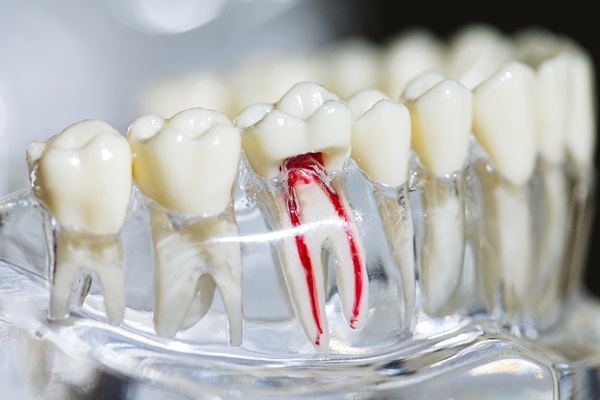The Root Canal Procedure Explained: Step-by-Step

A root canal removes the interior living tissues of a tooth in order to combat infection or address damage. While it is not a dentist’s first choice, it can be necessary when no other options will save the tooth. If you are scheduled for a root canal, you may have heard that this procedure causes pain or discomfort, but this is just a myth! In fact, patients who are experiencing pain due to a tooth infection can experience immediate relief after a root canal.
How a root canal procedure works
If patients feel uneasy about a root canal, one of the most helpful things that they can do to assuage this anxiety is to understand how the procedure works. Coming in prepared can ease fear and boost confidence.
Initial evaluation
Before a root canal is scheduled, the dentist will examine the problematic tooth and determine whether other options, such as fillings or crowns, are viable. The goal is always to preserve as much of the living tooth as possible, but some issues are only treatable with root canals. Once the dentist determines that this procedure is the most suitable one, the patient will schedule a separate appointment to have it done.
Preparing the tooth
At the root canal appointment, the dentist will first prepare the patient using sedatives or pain management medication. Then, they will prepare the tooth. Typically, this involves isolating it from the rest of the mouth using a plastic shield and placing gauze near the salivary glands to reduce moisture. Once the tooth is clean and dry, the root canal can begin.
The dentist will use a small drill similar to the one used for cavities. By gently drilling into the vulnerable part of the tooth, the dentist can access the pulp chamber, which is the innermost part of the tooth.
Removing the pulp
Inside the pulp chamber are blood vessels and nerves supplying the tooth and relaying information back to the brain. If these tissues are compromised, they need to be removed, which the dentist will do using a specialized tool built specifically for this purpose. They will insert the tool through the gap created by the dental drill, remove the pulp contents, and then thoroughly clean the now-empty inside of the tooth.
Sealing the tooth
Once the pulp chamber is empty and clean, the dentist can fill it with a material called gutta-percha. This prevents the tooth from being hollow, which could cause it to become brittle.
Then, the dentist seals the entry point with a filling, just as if it were a cavity. They smooth the filling so it fits seamlessly with the rest of the tooth, and the procedure is complete.
Schedule your root canal procedure quickly
If you need a root canal, you should schedule the procedure as soon as possible so the problem does not have the opportunity to worsen. Contact our office to schedule your root canal. We will keep you comfortable and informed throughout the process!
Request an appointment here: https://www.drscottdlurie.com or call Dr. Scott D. Lurie at (732) 227-4814 for an appointment in our East Brunswick office.
Check out what others are saying about our dental services on Yelp: Root Canal in East Brunswick, NJ.
Related Posts
An emergency dentist provides immediate care for urgent dental issues. Dental emergencies can happen anytime, often causing pain or discomfort that cannot wait for a regular appointment. Recognizing the signs of a dental emergency helps patients seek the right care quickly and can prevent further complications and protect their oral health.A dental emergency calls for…
Restorative dentistry treatments can change your smile and oral health dramatically. This dental subspecialty is particular because it allows patients to once again enjoy normal oral functions. The services deal with dental problems and help patients get back self-esteem and quality of life.The primary focus of a restorative dentist is the diagnosis, prevention, and treatment…
General dentists recommend adding flossing to your oral hygiene routine once a day. This important practice removes plaque and food debris that brushing alone cannot reach. While string floss is an effective way to clean between your teeth, several alternative methods can make the cleaning process more comfortable and efficient.Flossing is an essential part of…
Whether you are about to book an appointment for tooth implants or you have just undergone the procedure, you probably want to learn proper aftercare to ensure healing and recovery. One of the questions that patients often ask is what and what not to eat after surgery. Although placing implants ensures that you have dental…
